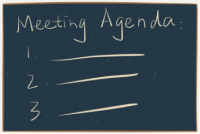Group meetings play an important role in almost every course in the MBA program. Efficient group meetings help you better understand the course content and give you more time to focus on what you are really interested in, while inefficient group meetings usually exhaust the team members and negatively impact the trust among all participants.
 There are some general rules for organizing an efficient group meeting:
There are some general rules for organizing an efficient group meeting:
- Be punctual, well-prepared and engaged
This attitude towards group meeting shows your respect to other teammates, which sets a running start for the whole meeting. It is impossible to finish the meeting on time if someone arrives late. Being well-prepared and engaged can push the discussion into new territories and ensure that everyone stays on the same page. - Set the agenda at the beginning
This is one of the most important things in a meeting. I experienced some meetings without a set agenda. These meetings often lasted longer than the team expected. Moreover, teammates got lost during the meeting and started to argue about unimportant points. The agenda is like a meeting guide, telling all teammates what topics to focus on and how long to spend on each one. - Assign roles to teammates
There are four meeting roles to be assigned to different participants:
Task manager – This is the meeting leader who focuses on substantial tasks and leads the decision-making process.
Facilitator – This person manages the discussion process to ensure that all members participate and that the conversation isn’t dominated by one person. He/she also controls the pace of each discussion.
Timekeeper – This person keeps an eye on time to help the facilitator move the group through agenda.
Scribe – This person keeps notes for the meeting. This is especially important for key decisions and next steps. - Summarize the meeting at the end
Do not end your meeting with an ongoing discussion. Instead, take a few minutes to summarize the meeting to ensure that everyone understands the main points brought up in the meeting. It is always better if the note keeper can share the notes through emails within one day after the meeting.
If the group is based on a long-term project and will need to meet multiple times, here are three extra tips:
- Set a team charter in the first meeting to formalize some general principles for the group. The team charter discussion is a process of getting to know one another. You can tell your teammates what kind of feedback you prefer to accept, what would make you upset, how you want to settle the conflicts, etc. The team charter is built based on those discussions.
- Organize feedback sessions if things do not go well. With the purpose of achieving team goals more efficiently, share your feedback honestly and sincerely about how things are going. The feedback sessions can help you understand others’ feelings in different perspectives and help build trust among the team.
- Rotate the meeting roles among participants.
 Yang Yuan is a full-time MBA student with sales experience in IT. She is energetic and optimistic and has the ability to motivate people and generate enthusiasm. Yang loves cooking new dishes during her free time, despite the fact that sometimes, the experiment ends in failure. She also likes reading novels, especially novels about detectives and history. You can contact Yang at yya147@sfu.ca.
Yang Yuan is a full-time MBA student with sales experience in IT. She is energetic and optimistic and has the ability to motivate people and generate enthusiasm. Yang loves cooking new dishes during her free time, despite the fact that sometimes, the experiment ends in failure. She also likes reading novels, especially novels about detectives and history. You can contact Yang at yya147@sfu.ca.